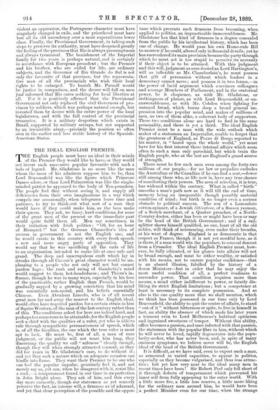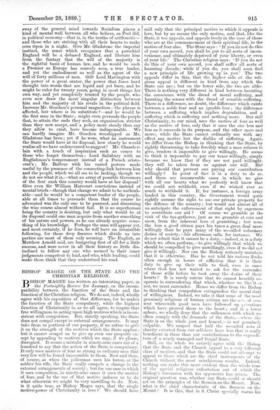THE IDEAL ENGLISH PREMIER. T HE English people must have an
ideal in their minds of the Premier they would like to have, or they would not invest each successive popular favourite with such a halo of legend. Mr. Gladstone is no more like the man whom the mass of his admirers suppose him to be, than Lord Beaconsfield was like the figure which Primrose Dames adore, or than Lord Palmerston was like the single- minded patriot he appeared to the body of Ten-pounders. The people feel that without seeing it, and supply all deficiencies from their own imaginations in a way which compels one occasionally, when telegrams leave time and patience, to try to think-out what sort of a man they would have if they could make him, as the bees make their queen. They ask, we fancy, hard conditions, for none of the great men of the present or the immediate past would quite fulfil them all. Men say sometimes, in their irritation with Irish politics " Oh for an hour of Bismarck !" but the German Chancellor's idea of success in government is not the English one, and he would create in this country with every fresh speech a new and more angry party of opposition. They would say that he was sacrificing all the ends of life to an organisation intended to make life at once safe and grand. The deep and unscrupulous craft which lay in streaks through all Cavour's great character would be un- pleasing to a people who not only will not but cannot pardon Iago ; the rush and swing of Gambetta's mind would suggest to them hot-headedness ; and Thiers's in- fluence, though he was in many ways, especially in his love of the practicable, rather English than French, would be gradually sapped by a growing conviction that his mind was essentially non-moral, and his beliefs essentially Chinese. Even Abraham Lincoln, who is of all recent great men far and away the nearest to the English ideal, would often have required pardon for a certain strain in him of Squire Western, of the man of the last century rather than of this. The conditions asked for here are indeed hard, and perhaps too numerous to be attainable, for the English people seek a chief with the qualities of a ruler, yet who is able to rule through sympathetic persuasiveness of speech, which is, of all the faculties, the one which the true ruler is most apt to lack. He must be, first of all, a man of sure judgment, or the public will not trust him long, they discerning the quality we call " safeness " clearly enough, though they will when strongly attracted consent, as they did for years in Mr. Gladstone's case, to do without it ; and yet they seek a nature which on adequate occasion can kindle into flame. They want their Premier to be one who can feel the popular impulse, genuinely feel it, and not merely say so, yet can, when he disagrees with it, resist like a rock,—a temperament found in our time in its perfection in John Bright alone. They ask of him, and this every day more earnestly, though our statesmen as yet scarcely perceive the fact, an intense will, a firmness as of adamant, and yet that clear perception of the possible and the oppor- tune which prevents such firmness from becoming, when applied to politics, an impracticable immoveableness. Mr. Gladstone has that kind of firmness in a degree concealed from the public by his intellectual history, which has been one of change. He would pass his own Home-rule Bill to-morrow if he could, altered only in financial details; yet he has surrendered its main provision because the party through which he must act is too stupid to perceive its necessity if their object is to be attained. With this judgment and this will, judgment as sure-footed as Lord Hartington's, will as inflexible as Mr. Chamberlain's, he must possess that gift of persuasion without which leaders in a democracy cannot move ; and possess it in two forms,—in the power of lucid argument which convinces colleagues and average Members of Parliament, and in the oratorical power, be it eloquence, as with Mr. Gladstone, or strikingness of phrase, as with Lord Beaconsfield, or un- answerableness, as with Mr. Cobden when fighting for untaxed bread, which burns deep a broad general im- pression into the popular mind, and makes of millions of men, no two of them alike, a coherent body of supporters. These two conditions alone are hard to find in the same personality, and there is yet a third. The ideal English Premier must be a man with the wide outlook which makes of a statesman an Imperialist, unable to forget that the greatness of England, as Pozzo di Borgo reported to his master, is " based upon the whole world," yet must have for his first interest those internal affairs which seem often to such a man only parochial, but which train the English people, who at the last are England's grand source of strength.
There must be few such men even among the forty-two millions of our people,—for no law or prejudice excludes the Australian or the Canadian if he can find a seat,—fewer still among those who, as life now is, have any true chance of manifesting their powers. The area of selection, it is true, has widened within the century. What is called " birth " smooths a man's path now as it will till the end of time, memory being an inseparable though possibly material condition of mind ; but birth is no longer even a serious obstacle to political success. The son of a Lancashire cotton-spinner, of a Jewish littarateur, of a Sussex yeoman, of a Scotch merchant, of a Quaker preacher, of a North- Country doctor, either has been or might have been or may be the head of the British Government ; and if a rail- splitter shows himself qualified, no one, least of all the old nobles, will think of murmuring, even under their breaths, at his want of degree. England is as democratic in that respect as France, though it is not yet needful here, as it is there, if a man would win the populace, to conceal descent from a Crusader. The ideal English Premier must, how- ever, be fully educated, or his glance into affairs will not be broad enough, and must be either wealthy, or satisfied with his means, not to ensure popular confidence—that is an absurd illusion, falsified by the history of a dozen Ministers—but in order that he may enjoy the most useful condition of all, a perfect readiness to surrender power. That condition requires more than means, a mind either indifferent to power, or faintly dis- liking its strict English limitations ; but a competence at least is necessary to its complete possession. And so also is the one quality more that we shall mention, which we think has been possessed in our time only by Lord Beaconsfield, the ability to quit the centre of affairs, to stand " out of it " without bitterness or spite, to live in himself in fact, an ability the absence of which made his later years a torment even to Lord Melbourne's habitual optimism and ingrained sweetness of temper. Without this ability, office becomes a passion, and once infected with that passion, the statesman with the popular fibre in him, without which he will never be loved, rapidly degenerates into the popu- larity-seeker, who has never been, and, in spite of many ominous symptoms, we believe never will be, the English ideal of the head of the British Government.
It is difficult, as we have said, even to' expect such a man, so armoured in varied capacities, to appear in politics, especially as they become vulgarised, and thus less attrac- tive ; but yet how very near to the ideal many men in recent times have been ! Sir Robert Peel only fell short of it through defects of temperament which prevented his inner self from fully appearing to the outer world. With a little More fire, a little less reserve, a little more liking for the ordinary men around him, he would have been a perfect Minister even for our time, when the strange sway of the general mind towards Socialism places a kind of mental wall between all who believe, as Peel did, in political economy—that is, in the truths of arithmetic— and those who are striving with all their hearts to make corn ripen in a night. Give Mr. Gladstone the imperial instinct, the sense which recognises that a parochial England will be a debased England, and liberate him from the fantasy that the will of the majority is the rightful basis of human law, and he would be such a Premier as Europe has scarcely seen, a true leader, and yet the embodiment as well as the agent of the will of forty millions of men. Gift Lord Hartington with the power of a great orator, the power that fuses hard thought into words that are liquid and yet burn, and he might be ruler for twenty years, going in most things his own way, and yet completely trusted by the people, who even now draw the most singular distinction between him and the majority of his rivals in the political field. Increase Mr. Goschen's personal magnetism—the phrase is affected, but• where is its substitute 9—and he would be the first man in the State ; might even persuade the people that, to attain the ends they seek, an organisation stricter than they now accept, and a policy more steady than any they allow to exist, have become indispensable. We can hardly imagine Mr. Goschen worshipped as Mr. Gladstone has been ; yet if he were, what an instrument the State would have at its disposal, how closely he would realise all we have endeavoured to suggest ! Mr. Chamber- lain with a touch of inspiration such as comes to those who forget themselves ; Lord Salisbury with an Englishman's temperament instead of a French aristo- crat's ; Mr. Balfour with his varied powers made useful by the presence of the connecting-link between him and the people, which we all see to be lacking, though we do not see what it is,—what an array of possible Governors of the first rank this country would have at her disposal ! Give even Sir William Harcourt convictions instead of mental briefs—though that change we admit to be unthink- able—and he would be a competent leader of the people, able at all times to persuade them that the course he advocated was the only one to be pursued, and discerning the wise course almost without fail. It is no superhuman being the country is desiring, but only what would be at its disposal could one man acquire from another something of his nature and powers, as he can already acquire some- thing of his knowledge. Perhaps the man will appear yet, and most certainly, if he does, he will have an irresistible following, for these deep fissures which divide us into parties are most of them only seeming. The English, as Matthew Arnold said, are hungering first of all for a little success, and were never in all their history so little dis- inclined to follow any one who seemed to their inner judgments competent to lead, and who, while leading, could make them think that they understood his road.



































 Previous page
Previous page